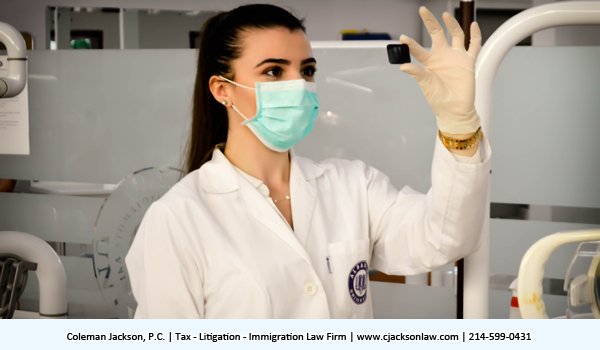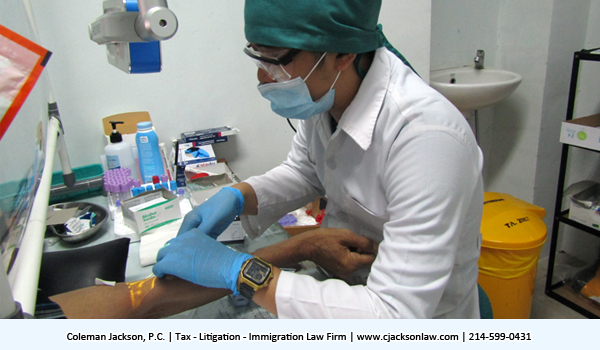October 9, 2020
By Coleman Jackson, Attorney

Covid-19 has revealed a lot of short comings in the health care system in the United States. An overwhelming majority of negative health outcomes have affected the minority communities throughout the country. The social injustices and the long tail of racial injustice and its impact on the health and well being of our follow citizens are glowing clearly down whatever dark path Covid-19 takes as it sweeps across America’s urban areas and rural areas and whatever other path this mysterious virus goes down. One thing is clear its impact is not equal on all of America.
America needs to do better. She must do much better by its citizenry. One place to start is making sure that a sufficient supply of quality healthcare workers is available to serve all America regardless of what they look like or how much money they have in the bank. Quality healthcare involves much more than universal health insurance and access to understaffed hospitals and clinics. There must be qualified, compassionate, skilled healthcare providers who are willing and able to serve communities throughout America staffing the hospitals, clinics and medical offices.
If there is a shortage in health care workers, can health insurance coverage alone solve the problems laid bear by Covid-19? There were a woefully insufficient number of healthcare workers in under served communities throughout the United States long before Covid-19 arrived on our shores. Health insurance does not solve this problem. Legislation enacted on November 12, 1999, 220 Public Law No. 106-95, 113 Statute 1312 Section 5 suppose to have made it easier for certain foreign physicians and other healthcare workers seeking to work and reside in the United States to enter the United States in the second employment-based preference category, known as the, EB-2 Visa under the national interest waiver. Now the EB-2 NIW is not the only visa that health care workers may use to work in the United States, for example, the H1-B, J-1, EB-1 and the traditional EB-2 are all visa types that might afford foreign health care workers the opportunity to live and work in the healthcare field within the United States. But the EB-2 NIW was designed to make it easier and shorten the time for foreign healthcare workers to come to the United States to live and work indefinitely in the healthcare industry.
The EB-2 NIW- Who Qualifies for the EB-2 National Interest Visa? All kinds of doctors, nurses and other healthcare workers may qualify; so long as, they agree to work full time in a field designated by the U.S. Department of Health and Human Services (HHS) as a health professional shortage area or in a Veterans Administration Hospital; and a federal agency or a state department of public health has determined that the healthcare workers’ service is in the public interest. These are the two prongs of the 1999 legislation establishing the EB-2 National Interest Waiver. They must be satisfied by obtaining a certification from the federal or state agency, such as the Veteran’s Hospital (VA) on the federal level or State Public Health Agency on the State level. Local health agency certification will prove to be insufficient and also private organization attestation of the public interest will prove to be insufficient to satisfy this requirement. A certification by the State Department of Public Health tend to be persuasive evidence of “public interest” when it comes to satisfying the National Interest Waiver certification requirement. Keep in mind that an NIW is generally considered an easier path to the second preference employment-based EB-2 visa. NIW healthcare workers must still satisfy all of the requirements for the traditional EB-2 visa in addition to the NIW requirements.

The EB-2 NIW- Does the EB-2 National Interest Visa applicant need to obtain a U.S. Department of Labor certification? The EB-2 NIW is exempt from labor certification requirements under the 1999 legislation. The physician or other healthcare worker must certify that they will work full time in a healthcare shortage area or VA hospital for five years. The healthcare worker must present credible evidence that their work will advance a critical national goal and that their work will benefit the public interest of the United States. In this time of Covid-19, this certification by the foreign healthcare worker could possibly be easier that ever before to meet due to increased coronavirus related sickness, hospitalizations and exhaustion and depletion of health industry capacity that was already strained in some rural and underserved areas of thee U.S. long before Covid-19 hit the American shores.
The EB-2 NIW- What is the process of applying and how long does it generally take from the filing of the application and working at an American hospital, clinic or other healthcare facility?First of all, the petitioner applying for an EB-2 NIW does not need a hospital or other institution to file the petition nor do they need a job offer. The foreign healthcare worker can self-petition for an EB-2 NIW. The petitioner must first file USCIS Form I-140 with supporting documentation showing the following:
- All identification evidence required for the traditional EB-2 visa;
- Written evidence that the two prongs of the National Interest Waiver showing that the healthcare worker will work full time in an underserved healthcare area, or in a Veterans Administration Hospital facility;
- Credible Credentialing evidence that shows or demonstrates that the physician or other healthcare worker has the educational, licensing, experience and other professional indicia required by Immigration and Nationalization Act Section 212(a)(5) (B) to work in the intended State of the United States in which they intend to work;
- All evidence required for USCIS Form I-485 Adjustment Application in the event an Immigrant Visa is immediately available. The immigrant must review theVisa Bulletin published each month by the U.S. Department of State in making the determination as to when to file Form I-485, Adjustment of Status Application; and
- Other credible evidence as required for healthcare workers in the State.
As for the processing times at the USCIS, currently processing times are over one year; but, processing times varies based on all facts and circumstances and during Covid-19 the process could take a few months if the foreign healthcare worker shows that their skills are in the public interest and that they are willing to serve at medical facilities with acute shortages or in underserved communities in rural and intercity America. It should be noted that although an adjustment of status application (Form I-485) can be filed when an immigrant visa is available and can even be filed concurrently with the I-140; the USCIS is not expected to approve the adjustment application until the healthcare worker has actually served in the underserved medical area for at least five years. Where to file for EB-2 NIW? Outside of the United Sates the foreign worker files the appropriate forms and supporting documents with the U.S. Consulates Office in their home country; whereas, inside the United These the petitioning foreign healthcare worker files the appropriate forms and supporting documents with USCIS who handles immigration processing inside the country. Premium or expedited processing could be available to speed up the processing of the I-140 petition; but the availability of premium processing is changed by the government from time to time upon short notice.
The EB-2 NIW- What about the healthcare workers spouse and family? The foreign workers spouse and children under the age of 18 may be admitted to the Unites States in the E-21 and E-22 immigrant visa status. Their spouse and children can enroll and attend school in the United States. During the pendency of the adjustment of status application, the spouse is eligible to file for Form I-765, Employment Authorization Application for approval to work in the Unites States. The spouse and the children can maintain this status and live in the United States indefinitely; so long as, the principal foreign worker maintains the EB-2 NIW immigration status. Let’s just note that the foreign worker and their spouse and children can travel freely inside and outside of the United States, so long as, they maintain the second preference employment-based visa immigration status. Once the individual family members adjustment of status application is approved (they get their Green Cards) and they can reside and work in the United States permanently and they can apply for U.S. citizenship after holding the Green Card status for five years.
This law blog is written by the Taxation | Litigation | Immigration Law Firm of Coleman Jackson, P.C. for educational purposes; it does not create an attorney-client relationship between this law firm and its reader. You should consult with legal counsel in your geographical area with respect to any legal issues impacting you, your family or business.
Coleman Jackson, P.C. | Taxation, Litigation, Immigration Law Firm | English (214) 599-0431 | Spanish (214) 599-0432 | Portuguese (214) 272-3100


